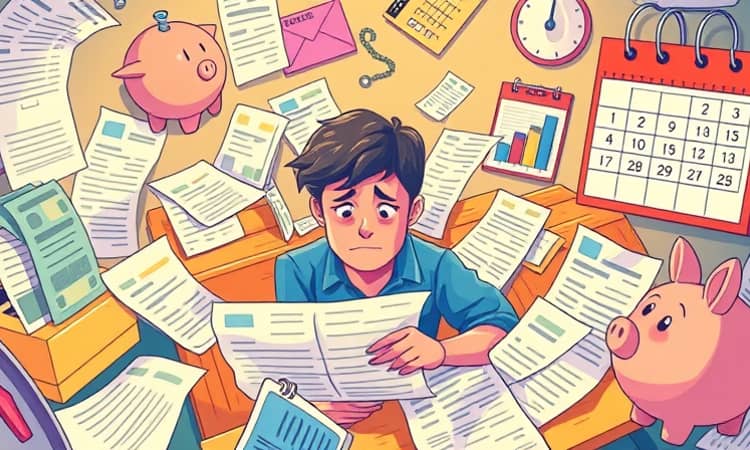Unexpected Expenses: How to Plan Ahead and Reduce Stress

Unexpected expenses can occur at any time and often catch us off guard. These unforeseen costs can add significant stress to our lives and disrupt our financial stability, making it essential to plan against them.
Understanding common unexpected expenses and how to prepare for them can significantly reduce the stress associated with financial uncertainty.
Common Unexpected Expenses

Unexpected expenses can come in many forms, ranging from medical bills to home repairs. These expenses can arise due to emergencies, accidents, or simple wear and tear over time.
Knowing what these common unexpected expenses are can help individuals plan better and allocate funds accordingly, minimizing their impact on overall financial health.
- Medical Emergencies
- Vehicle Repairs
- Home Maintenance or Repairs
- Unforeseen Travel Costs
- Job Loss or Income Reduction
Being aware of these costs allows individuals to anticipate the possibility of such events and prepare their finances to cushion any potential blow.
The Stress of Unexpected Expenses

The emotional burden of unexpected expenses can weigh heavily on individuals. When financial surprises happen, they can lead to feelings of anxiety, panic, and helplessness as one scrambles to find the funds required to cover costs.
Moreover, unexpected expenses may exacerbate existing financial challenges, leading to increased stress levels. The resulting urgency can derail planned budgets and make it difficult to achieve long-term financial goals.
Understanding this stress can motivate proactive planning and preparation, enabling individuals to develop strategies that can mitigate the negative ramifications of unforeseen financial obligations.
Planning Ahead for Unexpected Expenses

Planning ahead for unexpected expenses is crucial for maintaining financial stability. By taking steps to prepare, individuals can significantly decrease the stress associated with unexpected financial obligations.
1. Build an Emergency Fund
Establishing an emergency fund is one of the most effective ways to prepare for unexpected expenses. An emergency fund acts like a financial safety net, which can help individuals manage unforeseen costs without incurring debt.
Financial experts recommend saving three to six months' worth of living expenses as a cushion for emergencies. This amount can provide peace of mind and financial security in times of need.
- Set a monthly saving goal
- Open a dedicated savings account
- Contribute bonuses or unexpected income
- Review and adjust your savings plan regularly
By steadily contributing to an emergency fund, individuals can alleviate future financial stress, ensuring they are well-prepared for whatever life throws their way.
2. Budget for Irregular Expenses
Beyond emergency funds, it's essential to budget for irregular expenses that may not occur every month but can still disrupt financial plans. By anticipating costs such as car maintenance or annual memberships, individuals can better manage their budgets.
Incorporating these irregular expenses into a monthly budget can help prevent surprises and ensure funds are available when needed.
- Identify recurring irregular expenses
- Allocate a specific amount for these expenses in your budget
- Track spending to stay within limits
- Adjust budget categories as necessary
A well-structured budget takes into account both regular monthly expenses and those expected less frequently, paving the way for financial stability and less stress.
3. Get the Right Insurance
Insurance serves as an essential tool in protecting against unexpected expenses. Having the right insurance policies can save hundreds or even thousands of dollars in case of emergencies.
Essential insurance types to consider include health insurance, auto insurance, home insurance, and renters insurance, as these can shield individuals and families from unforeseen financial burdens.
- Health Insurance
- Auto Insurance
- Homeowners or Renters Insurance
- Life Insurance
By investing in the appropriate insurance policies, individuals can help ensure they are covered during emergencies, reducing both financial strain and stress.
4. Stay Out of Debt
It's vital to prioritize staying out of debt while preparing for potential unexpected expenses. Accumulating debt can adversely affect financial flexibility and increase stress during emergencies.
Being diligent about managing existing debt can also free up funds that can be redirected toward savings or unexpected expenses.
- Create a monthly debt repayment plan
- Avoid high-interest loans
- Limit credit card use to essential purchases
- Seek financial advice if necessary
Maintaining a healthy debt level can enhance financial stability, enabling individuals to face unexpected challenges head-on.
Reducing the Impact of Unexpected Expenses

Even with careful planning, unexpected expenses can still arise. Therefore, it's essential to develop strategies to minimize their financial impact when they occur.
1. Negotiate Bills and Expenses
People often overlook the potential to negotiate bills and expenses. Many service providers, including insurance companies and utility providers, are willing to negotiate costs with their customers.
By reaching out and discussing possible discounts or payment plans, individuals can potentially reduce their monthly financial burden, providing more flexibility in their budgets.
- Contact service providers to request a better rate
- Inquire about available discounts
- Discuss payment plans for large bills
- Inspect bills for errors or discrepancies
Negotiating can lead to significant savings and less financial stress, especially during tougher times.
2. Use Credit Wisely
While credit can be a useful tool, it's crucial to use it wisely and avoid over-reliance on it for unexpected expenses. Maintaining a healthy credit utilization ratio ensures that credit remains available when truly needed.
Additionally, using credit wisely helps maintain a good credit score, thus fostering better lending terms in the future.
- Consider low-interest credit options
- Use credit cards for essentials only
- Pay off balances monthly to avoid interest
- Keep track of credit utilization ratio
Using credit responsibly can provide a safety net for emergencies without leading to long-term debt.
3. Sell Unwanted Items
Decluttering your home can provide not only a cleaner space but also extra cash for unexpected expenses. Many people have items they no longer use or need that can be sold for profit.
Selling unwanted items can also create additional space in your home, making it a win-win situation.
- Use online marketplaces
- Host garage sales
- Donate items for a tax deduction
- Utilize community sales or swap events
This strategy can also be a quick way to raise funds for unexpected livings costs.
4. Cut Back on Non-Essential Spending
Re-evaluating spending habits can help individuals identify areas where they can cut back on non-essential expenses. This practice can free up extra money that can be redirected toward savings or unforeseen costs.
Small adjustments to daily expenses—a few less luxuries here and there—can accumulate over time, providing a financial buffer against unexpected bills.
Conclusion

In conclusion, unexpected expenses are an inevitable part of life, but they do not have to induce stress or financial instability. By planning ahead and developing robust financial strategies, individuals can prepare for unforeseen costs and reduce anxiety.
Through budgeting, saving, and responsibly managing expenses, one can create a financial cushion that enables a more resilient approach to life's uncertainties.






